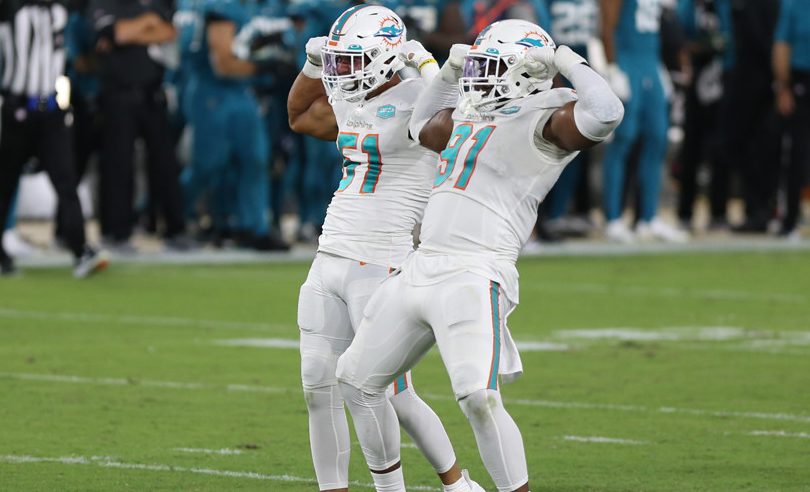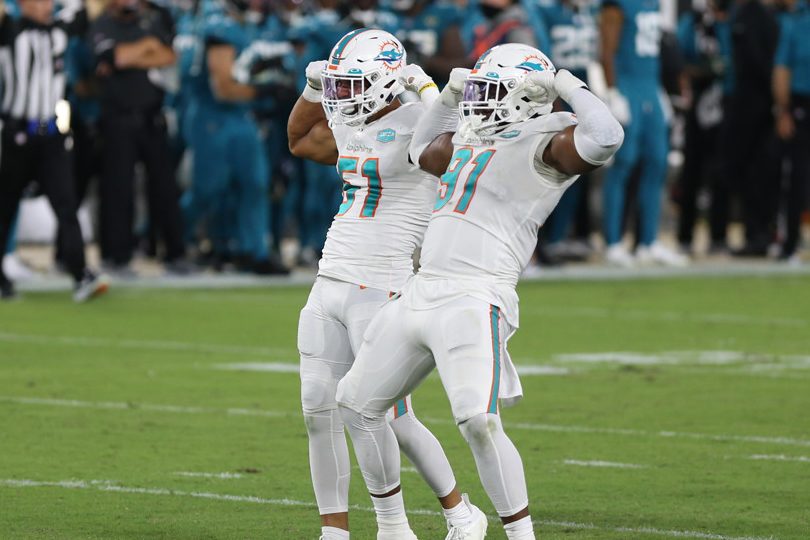NFL Betting: Are Teams With Extreme Yards Per Point Good Bets?
November 6, 2020 – by Jason Lisk

The Miami Dolphins are among the league leaders in points allowed, but need help down the stretch to get in the postseason (Photo by David Rosenblum/Icon Sportswire)
The Miami Dolphins won their game over the Los Angeles Rams in Week 8 while having less than 200 yards, thanks to good defense, turnovers, and special teams play. They managed 28 points on 145 yards of offense.
That 5.2 yards per point scored is easily the lowest mark for yards per point in any one game this year. (The average for 2020 is 14.7 yards per point scored.)
The Pittsburgh Steelers also won a game against Baltimore with 28 points on only 221 yards of offense, thanks to turnovers, field position, and converting the few long drives they did have into touchdowns instead of field goals.
That performance also rates in the top 5 games this season for least offensive yards per point scored.
It’s not the first time that those teams, though, have put up good performances by points scored, relative to yards.
For the season, Miami is a stunning 1st (as in the best in the league) in points allowed per game, while being only 20th in yards allowed. On offense, they are 11th in points scored, while being all the way down at 28th in yards gained. The Steelers are 5th in points scored, but only 25th in yards gained. (The Steelers defensive rankings in points allowed and yards allowed are more even, 5th and 6th respectively.)
You can see the teams that have been best at converting yards to points on our NFL Team Yards per Point page. The top five are Pittsburgh, Tampa Bay, Miami, Seattle, and Baltimore.
For our purposes, we want to explore whether teams that are scoring points at a higher rate relative to the yards they gain tend to regress during that the same season, and how that is handled by the betting markets.
Why Some Teams Score Points at a Higher Rate Than Yards Gained
Content:
ToggleAs we noted above, teams will score a point for about every 14.7 yards they gain. Pittsburgh, after eight weeks, is averaging 11.2 yards per point. Miami is at 12.1 yards per point.
Teams that need fewer yards to score points may do so for a combination of reasons, including:
Defensive Turnovers: they generate turnovers, meaning the offense has to gain fewer yards to score points (possibly zero yards, if the defense scores directly);Offensive Turnovers: they do not turn the ball over frequently, so that they have fewer empty drives;Maximizing points: they make their field goal attempts, and they perform well in the red zone. That means a higher rate of drives end in touchdowns than field goals once closer to the goal line;Hidden special teams yards: they have good special teams play, so that they win the battle of “hidden yards” that improve field position
Conversely, teams that tend to underperform those areas will have fewer points scored than the yards gained would suggest.
Both Miami and Pittsburgh rank in the top four in average starting field position. They are each in the top five in punt return average (and Miami is the only team with a punt return touchdown this year). Both teams are tied for second in turnovers forced per game. They are two of the four teams not to miss a field goal so far this season, while also ranking in the top three in terms of opponents missing field goals against them.
Correlations of Points Scored to Yards Gained
To examine whether teams who fare well in yards per point tend to regress, we compared the first eight games to the last eight games for each team’s season over the last decade (2010-2019). We looked at the points scored, allowed, and yards gained and allowed over each of those spans, as well as the yards per point scored.
Here are some takeaways:
Get access to all betting content, picks and models
Free subscription offers now available!
Subscribe now
Already a premium subscriber? Sign in for access
NFL Football Pool Picks NFL Survivor Pool Picks NCAA Bracket Picks College Bowl Pool Picks College Football Pool Picks NFL Picks NBA Picks MLB Picks College Football Picks College Basketball Picks NFL Predictions NBA Predictions MLB Predictions College Football Predictions College Basketball Predictions NFL Spread Picks NBA Spread Picks MLB Spread Picks College Football Spread Picks College Basketball Spread Picks NFL Rankings NBA Rankings MLB Rankings College Football Rankings College Basketball Rankings NFL Stats NBA Stats MLB Stats College Football Stats College Basketball Stats NFL Odds NBA Odds MLB Odds College Football Odds College Basketball Odds A product ofTeamRankings BlogAboutTeamJobsContact
© 2005-2024 Team Rankings, LLC. All Rights Reserved. Statistical data provided by Gracenote.
TeamRankings.com is not affiliated with the National Collegiate Athletic Association (NCAA®) or March Madness Athletic Association, neither of which has supplied, reviewed, approved or endorsed the material on this site. TeamRankings.com is solely responsible for this site but makes no guarantee about the accuracy or completeness of the information herein.
Terms of ServicePrivacy Policy



